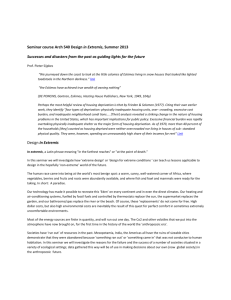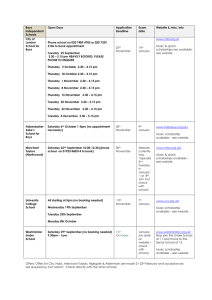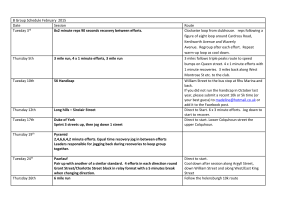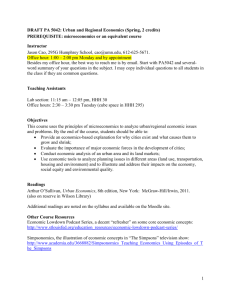World Regions and Cultures: Diversity & Interconnections
advertisement
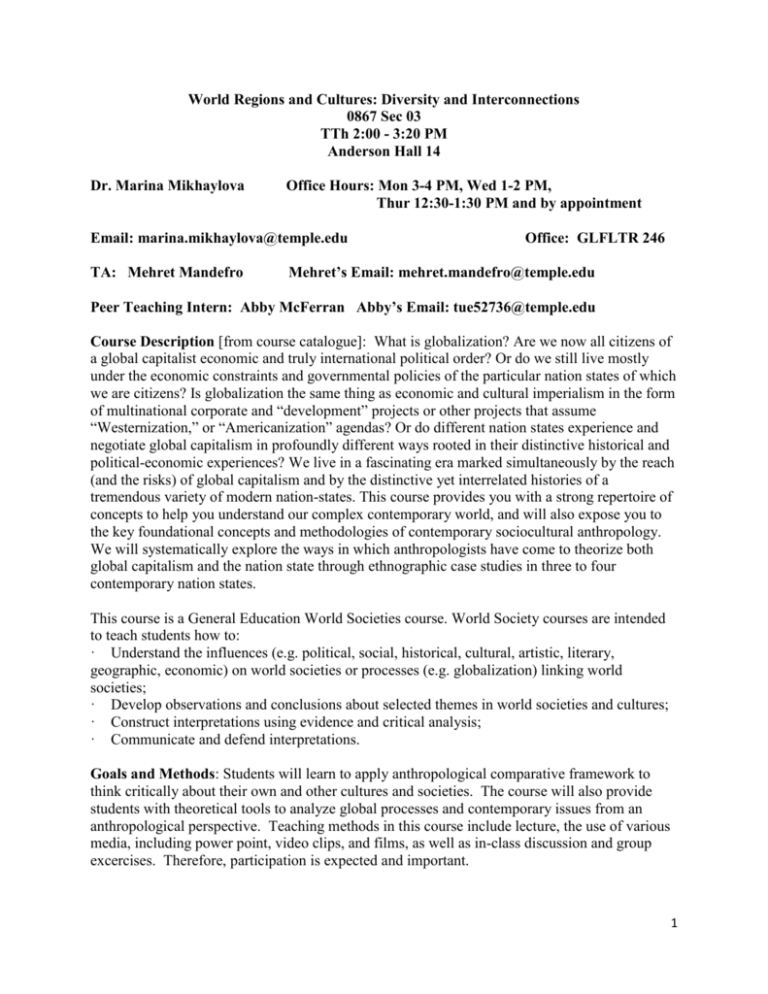
World Regions and Cultures: Diversity and Interconnections 0867 Sec 03 TTh 2:00 - 3:20 PM Anderson Hall 14 Dr. Marina Mikhaylova Office Hours: Mon 3-4 PM, Wed 1-2 PM, Thur 12:30-1:30 PM and by appointment Email: marina.mikhaylova@temple.edu TA: Mehret Mandefro Office: GLFLTR 246 Mehret’s Email: mehret.mandefro@temple.edu Peer Teaching Intern: Abby McFerran Abby’s Email: tue52736@temple.edu Course Description [from course catalogue]: What is globalization? Are we now all citizens of a global capitalist economic and truly international political order? Or do we still live mostly under the economic constraints and governmental policies of the particular nation states of which we are citizens? Is globalization the same thing as economic and cultural imperialism in the form of multinational corporate and “development” projects or other projects that assume “Westernization,” or “Americanization” agendas? Or do different nation states experience and negotiate global capitalism in profoundly different ways rooted in their distinctive historical and political-economic experiences? We live in a fascinating era marked simultaneously by the reach (and the risks) of global capitalism and by the distinctive yet interrelated histories of a tremendous variety of modern nation-states. This course provides you with a strong repertoire of concepts to help you understand our complex contemporary world, and will also expose you to the key foundational concepts and methodologies of contemporary sociocultural anthropology. We will systematically explore the ways in which anthropologists have come to theorize both global capitalism and the nation state through ethnographic case studies in three to four contemporary nation states. This course is a General Education World Societies course. World Society courses are intended to teach students how to: · Understand the influences (e.g. political, social, historical, cultural, artistic, literary, geographic, economic) on world societies or processes (e.g. globalization) linking world societies; · Develop observations and conclusions about selected themes in world societies and cultures; · Construct interpretations using evidence and critical analysis; · Communicate and defend interpretations. Goals and Methods: Students will learn to apply anthropological comparative framework to think critically about their own and other cultures and societies. The course will also provide students with theoretical tools to analyze global processes and contemporary issues from an anthropological perspective. Teaching methods in this course include lecture, the use of various media, including power point, video clips, and films, as well as in-class discussion and group excercises. Therefore, participation is expected and important. 1 Readings Required book: Liechty, Mark. Suitably Modern: Making Middle-Class Culture in a New Consumer Society. It is available at the University’s bookstore. All other readings will be available online through Blackboard. The readings on the syllabus are preliminary: check online for up-to-date information on assigned readings. Please read the texts for the date they are assigned. Evaluation Students will be evaluated on the basis of: Final Exam 35% Midterm Exam 30% Two Reading Response Papers (each 10%) 20% Attendance/Participation 15% Attendance/Participation Students are expected to attend lectures and do all of the readings by the assigned date. I will take attendance. Students are allowed only two unexcused absences. Students should be ready to participate in discussions and in-class assignments. There will be two short response paper assignments, which will be explained in class. Midterm and final are in the form of written inclass essays and short questions. The final exam is cumulative. Reading Responses Reading responses should be 2-3 double-spaced pages (one inch margins, 12 point font). The response paper should cover all of the readings for the week when they are due and should include: · Brief summary of the readings · How do the readings relate to one another? · What were the most important/interesting points of the readings? · What do the readings fail to address or what questions do they provoke? · What do they highlight about the broader topic (conclusion)? Statement on Plagiarism and Cheating Plagiarism and cheating will not be tolerated in this course and will result in a failing grade. All the material drawn from books or internet sources must be properly cited in papers. Quotations marks and the exact page number must be used for direct quotes. Paraphrased material must be cited as well. Cheating during exams or on papers is not acceptable. UNIVERSITY POLICIES Disability Statement: This course is open to all students who meet the academic requirements for participation. Any student who has a need for accommodation based on the impact of a disability should contact the instructor privately to discuss the specific situation as soon as possible. Contact Disability Resources and Services at 215-204-1280 in 100 Ritter Annex to coordinate reasonable accommodations for students with documented disabilities. Statement on Academic Freedom: Freedom to teach and freedom to learn are inseparable facets of academic freedom. The University has adopted a policy on Student and Faculty 2 Academic Rights and Responsibilities (Policy # 03.70.02) which can be accessed through the following link: http://policies.temple.edu/getdoc.asp?policy_no=03.70.02 Course Readings I. CAPITALISM, COLONIALISM, AND NATIONALISM IN THE GLOBAL REALM Globalization and Anthropology Tuesday, August 27 Introduction. Thursday, August 29 Friedman, Thomas. “The Groundswell.” Lexus and the Olive Tree. 2000. Debates about Global History Tuesday, September 3 Fukuyama, Francis. “The End of History.” Barber, Benjamin. “Jihad vs. McWorld.” Pp. 268-273 Thursday, September 5 Wilk, Richard. “Television, Time, and the National Imaginary in Belize.” In Media Worlds. Globalization and Cultural Difference Tuesday, September 10 Huntington, Samuel. “The Clash of Civilizations.” Foreign Affairs. 1993. Thursday, September 12 Said, Edward. “The Clash of Ignorance.” The Nation. October 22, 2001. Edward Said. “Introduction.” Orientalism. 1978. Colonialism, Capitalism, and Colonial Legacies Tuesday, September 17 Mohandas Gandhi. “The Doctrine of the Sword.” In Bronner, Stephen, ed. Twentieth Century Political Theory. Frantz Fanon. “Concerning Violence.” In Bronner, Stephen, ed. Twentieth Century Political Theory. Thursday, September 19 Abu-Lughod, Lila. “Do Muslim Women Really Need Saving? Anthropological Reflections on Cultural Relativism and Its Others” (2002) 3 Social Construction of Nationalism and Race Tuesday, September 24 Walker Connor. “When is the Nation?” Pp. 154-159. In Smith, ed. Nationalism. Thursday, September 26 AAA “Official Statement on ‘Race’” (1997). In Podolefsky and Brown eds. Applying Cultural Anthropology 1st Reading Response is due at the beginning of the class (on Connor and AAA) II. SYMPTOMS OF GLOBALIZATION Migration as Everyday Reality Tuesday, October 1 VanWey, Tucker, and McConnell. “Community Organization, Migration and Remittances in Oaxaca.” Latin American Research Review, Vol. 40, No. 1, February 2005. Thursday, October 3 Hochshild, Arlie. “Global Care Chains and Emotional Surplus Value.” 2000. Transnational Politics and the EU Tuesday, October 8 Shore, Cris. Building Europe: The Cultural Politics of European Integration. pp. 1-40. Thursday, October 10 MIDTERM Transnational Criminal Networks Tuesday, October 15 Farah, Douglas and Braun, Stephen. “The Merchant of Death.” In Foreign Policy. 2006. Thursday, October 17 Papachristos, Andrew “Gang World” (pp. 48-55). In Foreign Policy. 147. 2005. Ludlow, Peter. “WikiLeaks and Hacktivist Culture.” The Nation. October 4. 2010. Managing Urban Populations Tuesday, October 22 Sassen, Saskia. Cities in a World Economy. Thousand Oaks, California: Pine Forge Press. 2006. “Global Cities and Global Survival Circuits” (177-189). Thursday, October 24 4 Davis, Mike. Planet of Slums. “Urban Involution and the Informal Proletariat.” Davis, Mike. Planet of Slums. “Down Vietnam Street.” Dilemmas of Development Tuesday, October 29 Schwartz, Timothy. Travesty in Haiti: A true account of Christian missions, orphanages, fraud, food aid and drug trafficking. BookSurge Publishing. 2010. (Pp. 1-31). Tuesday, October 31 Schwartz. (Pp. 125-187; 235-263). III. CASE STUDIES: LOCAL EFFECTS OF GLOBAL PROCESSES Socialism, Capitalism, and Domestication of “The West” Tuesday, November 5 Yurchak, Alexei. “Imaginary West: The Elsewhere of Late Communism” in Everything Was Forever Until It Was No More: The Last Soviet Generation. Princeton, NJ: Princeton University Press. 2006. (Pp. 158-207). Thursday, November 7 Yurchak, Alexei. “Gagarin and the Rave Kids: Transforming Power, Identity, and Aesthetics in Post-Soviet Russia.” In Barker, ed. Consuming Russia. 1999. (Pp. 76-109). Social Class in Nepal Tuesday, November 12 Liechty, Mark. Suitably Modern. Chapter 1, Chapter 2. Thursday, November 14 Liechty. Chapter 3 2nd Reading Response is due at the beginning of the class on Chapters 1, 2, and 3. Local Consumption of Global Goods Tuesday, November 19 Liechty. Chapter 4, 5 Thursday, November 21 Liechty. Chapter 6. Film Viewing. Media and Dreams of Modernity Tuesday, November 26 Liechty. Chapter 7, 8. 5 Thursday, November 28 THANKSGIVING BREAK – NO CLASS Tuesday, December 3 Liechty. Chapter 9, 10. Final Review. FINAL EXAM: Tuesday, December 10, 1 PM – 3 PM. Regular classroom. 6



